ANG
-
 KAIST Holds Its Fourth Public Art Exhibition
KAIST hosted an opening ceremony for the annual art exhibition on December 3, 2015 at the KAIST Institute building. The KAIST Art and Design Committee first organized the event in 2012 to promote the integration of art and technology.
This year’s event entitled “Understanding the Purpose of an Object” will display 20 art pieces under six themes. Artist Keumhong Lee, Haeyool Roh, Joon Kim, Kyung Lee, and Juhae Yang participated in the exhibition. The names of some of the art pieces include “Feedback Field” by Joon Kim, “Self Action” by Haeyool Roh, and “Net of Time” by Juhae Yang.
Juhae Yang believes that, in the digital age, an identity of an object is defined by the traces of light which we read in the information hidden in the barcodes. Based on this interpretation, she transforms the black bars and white spaces into a harmony of colors and sounds. The continuum of colors and sounds in her work arouses time-space synesthesia.
Professor Sangmin Bae of the Industrial Design Department, the Director of the KAIST Art and Design Committee, hopes that the exhibition will inspire novel scientific ideas and artistic spirits.
The exhibition will remain open to the public until December 20, 2015.
2015.12.03 View 8880
KAIST Holds Its Fourth Public Art Exhibition
KAIST hosted an opening ceremony for the annual art exhibition on December 3, 2015 at the KAIST Institute building. The KAIST Art and Design Committee first organized the event in 2012 to promote the integration of art and technology.
This year’s event entitled “Understanding the Purpose of an Object” will display 20 art pieces under six themes. Artist Keumhong Lee, Haeyool Roh, Joon Kim, Kyung Lee, and Juhae Yang participated in the exhibition. The names of some of the art pieces include “Feedback Field” by Joon Kim, “Self Action” by Haeyool Roh, and “Net of Time” by Juhae Yang.
Juhae Yang believes that, in the digital age, an identity of an object is defined by the traces of light which we read in the information hidden in the barcodes. Based on this interpretation, she transforms the black bars and white spaces into a harmony of colors and sounds. The continuum of colors and sounds in her work arouses time-space synesthesia.
Professor Sangmin Bae of the Industrial Design Department, the Director of the KAIST Art and Design Committee, hopes that the exhibition will inspire novel scientific ideas and artistic spirits.
The exhibition will remain open to the public until December 20, 2015.
2015.12.03 View 8880 -
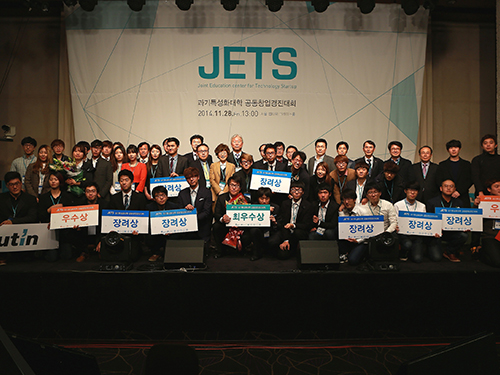 KAIST and Four Science and Technology Universities Host a Start-up Competition
KAIST and four other science and technology universities, such as Gwangju Institute of Science and Technology (GIST), Ulsan National Institute of Science and Technology (UNIST), Daegu Gyeongbuk Institute of Science and Technology (DGIST), and Pohang University of Science and Technology (POSTECH), hosted a startup competition on November 27, 2015 at the Dongdaemun Design Plaza in Seoul.
Approximately 150 participants including students from the five universities, "angel" investors, and entrepreneurs attended the competition.
The competition was held to promote startups that are based on research achievements in science and technology and to foster entrepreneurs with great potential.
Two hundred and sixty applicants from 81 teams competed this year. Only ten teams made it to the finals.
KAIST students presented two business plans: an experience-centered education platform and mobile taxi-pooling service. Students from other universities presented a brain-stimulating simulation software (GIST), handy smart health trainer (GIST), real-time reporting system for luggage (DGIST), a flower delivery system (UNIST), surveillance and alarm system for stock-related events via machinery studies (UNIST), augmented emotion toys using augmented reality (POSTECH), and a nasal spray for fine dust prevention (POSTECH).
KAIST also displayed an exhibition of “wearable haptic device for multimedia contents” and “next generation recommendation service platform based on one-on-one matching system with high expandability and improved user experience system.”
The winning team received an award from the Minister of Science, ICT and Future Planning of Korea, as well as an opportunity to participate in overseas startup programs over the course of ten days.
Joongmyeon Bae, Director of the KAIST Industry and University Cooperation, who organized the contest, said, “The alumni of Stanford University (USA) has annually created over 5.4 million jobs through startup activities. Likewise, we hope that our event will contribute to job creation by fostering innovative entrepreneurs.”
2015.11.26 View 11354
KAIST and Four Science and Technology Universities Host a Start-up Competition
KAIST and four other science and technology universities, such as Gwangju Institute of Science and Technology (GIST), Ulsan National Institute of Science and Technology (UNIST), Daegu Gyeongbuk Institute of Science and Technology (DGIST), and Pohang University of Science and Technology (POSTECH), hosted a startup competition on November 27, 2015 at the Dongdaemun Design Plaza in Seoul.
Approximately 150 participants including students from the five universities, "angel" investors, and entrepreneurs attended the competition.
The competition was held to promote startups that are based on research achievements in science and technology and to foster entrepreneurs with great potential.
Two hundred and sixty applicants from 81 teams competed this year. Only ten teams made it to the finals.
KAIST students presented two business plans: an experience-centered education platform and mobile taxi-pooling service. Students from other universities presented a brain-stimulating simulation software (GIST), handy smart health trainer (GIST), real-time reporting system for luggage (DGIST), a flower delivery system (UNIST), surveillance and alarm system for stock-related events via machinery studies (UNIST), augmented emotion toys using augmented reality (POSTECH), and a nasal spray for fine dust prevention (POSTECH).
KAIST also displayed an exhibition of “wearable haptic device for multimedia contents” and “next generation recommendation service platform based on one-on-one matching system with high expandability and improved user experience system.”
The winning team received an award from the Minister of Science, ICT and Future Planning of Korea, as well as an opportunity to participate in overseas startup programs over the course of ten days.
Joongmyeon Bae, Director of the KAIST Industry and University Cooperation, who organized the contest, said, “The alumni of Stanford University (USA) has annually created over 5.4 million jobs through startup activities. Likewise, we hope that our event will contribute to job creation by fostering innovative entrepreneurs.”
2015.11.26 View 11354 -
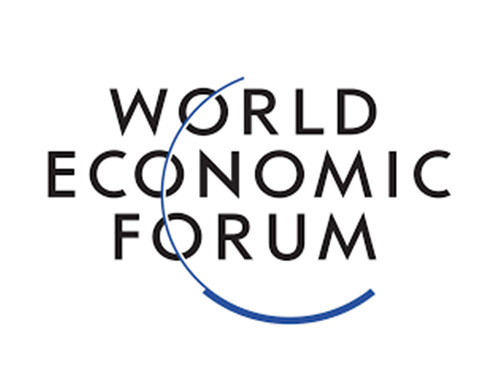 HUBO to Present at the 2016 World Economic Forum
KAIST researchers will lead an IdeasLab on biotechnology for an aging society while HUBO, the winner of the 2015 DARPA Robotics Challenge, will interact with the forum participants, offering an experience of state-of-the-art robotics technology.
Representatives from KAIST will attend the 2016 Annual Meeting of the World Economic Forum to run an IdeasLab and showcase its humanoid robot.
With over 2,500 leaders from business, government, international organizations, civil society, academia, media, and the arts expected to participate, the 2016 Annual Meeting will take place on January 20-23, 2016 in Davos-Klosters, Switzerland. Under the theme of “Mastering the Fourth Industrial Revolution,” global leaders will discuss the period of digital transformation that will have profound effects on economies, societies, and human behavior.
President Sung-Mo Kang will join the Global University Leaders Forum (GULF), a high-level academic meeting to foster collaboration among experts on issues of global concern for the future of higher education and the role of science in society. He will discuss how the emerging revolution in technology will affect the way universities operate and serve society. KAIST is the only Korean university participating in GULF, which is composed of prestigious universities invited from around the world.
Four KAIST professors, including Distinguished Professor Sang Yup Lee of the Chemical and Biomolecular Engineering Department, will lead an IdeasLab on “Biotechnology for an Aging Society.”
Professor Lee said, “In recent decades, much attention has been paid to the potential effect of the growth of an aging population and problems posed by it. At our IdeasLab, we will introduce some of our research breakthroughs in biotechnology to address the challenges of an aging society.”
In particular, he will present his latest research in systems biotechnology and metabolic engineering. His research has explained the mechanisms of how traditional Oriental medicine works in our bodies by identifying structural similarities between effective compounds in traditional medicine and human metabolites, and has proposed more effective treatments by employing such compounds.
KAIST will also display its networked mobile medical service system, “Dr. M.” Built upon a ubiquitous and mobile Internet, such as the Internet of Things, wearable electronics, and smart homes and vehicles, Dr. M will provide patients with a more affordable and accessible healthcare service.
In addition, Professor Jun-Ho Oh of the Mechanical Engineering Department will showcase his humanoid robot, “HUBO,” during the Annual Meeting. His research team won the International Humanoid Robotics Challenge hosted by the United States Defense Advanced Research Projects Agency (DARPA), which was held in Pomona, California, on June 5-6, 2015. With 24 international teams participating in the finals, HUBO completed all eight tasks in 44 minutes and 28 seconds, 6 minutes earlier than the runner-up, and almost 11 minutes earlier than the third-place team. Team KAIST walked away with the grand prize of USD 2 million.
Professor Oh said, “Robotics technology will grow exponentially in this century, becoming a real driving force to expedite the Fourth Industrial Revolution. I hope HUBO will offer an opportunity to learn about the current advances in robotics technology.”
President Kang pointed out, “KAIST has participated in the Annual Meeting of the World Economic Forum since 2011 and has engaged with a broad spectrum of global leaders through numerous presentations and demonstrations of our excellence in education and research. Next year, we will choreograph our first robotics exhibition on HUBO and present high-tech research results in biotechnology, which, I believe, epitomizes how science and technology breakthroughs in the Fourth Industrial Revolution will shape our future in an unprecedented way.”
2015.11.18 View 12709
HUBO to Present at the 2016 World Economic Forum
KAIST researchers will lead an IdeasLab on biotechnology for an aging society while HUBO, the winner of the 2015 DARPA Robotics Challenge, will interact with the forum participants, offering an experience of state-of-the-art robotics technology.
Representatives from KAIST will attend the 2016 Annual Meeting of the World Economic Forum to run an IdeasLab and showcase its humanoid robot.
With over 2,500 leaders from business, government, international organizations, civil society, academia, media, and the arts expected to participate, the 2016 Annual Meeting will take place on January 20-23, 2016 in Davos-Klosters, Switzerland. Under the theme of “Mastering the Fourth Industrial Revolution,” global leaders will discuss the period of digital transformation that will have profound effects on economies, societies, and human behavior.
President Sung-Mo Kang will join the Global University Leaders Forum (GULF), a high-level academic meeting to foster collaboration among experts on issues of global concern for the future of higher education and the role of science in society. He will discuss how the emerging revolution in technology will affect the way universities operate and serve society. KAIST is the only Korean university participating in GULF, which is composed of prestigious universities invited from around the world.
Four KAIST professors, including Distinguished Professor Sang Yup Lee of the Chemical and Biomolecular Engineering Department, will lead an IdeasLab on “Biotechnology for an Aging Society.”
Professor Lee said, “In recent decades, much attention has been paid to the potential effect of the growth of an aging population and problems posed by it. At our IdeasLab, we will introduce some of our research breakthroughs in biotechnology to address the challenges of an aging society.”
In particular, he will present his latest research in systems biotechnology and metabolic engineering. His research has explained the mechanisms of how traditional Oriental medicine works in our bodies by identifying structural similarities between effective compounds in traditional medicine and human metabolites, and has proposed more effective treatments by employing such compounds.
KAIST will also display its networked mobile medical service system, “Dr. M.” Built upon a ubiquitous and mobile Internet, such as the Internet of Things, wearable electronics, and smart homes and vehicles, Dr. M will provide patients with a more affordable and accessible healthcare service.
In addition, Professor Jun-Ho Oh of the Mechanical Engineering Department will showcase his humanoid robot, “HUBO,” during the Annual Meeting. His research team won the International Humanoid Robotics Challenge hosted by the United States Defense Advanced Research Projects Agency (DARPA), which was held in Pomona, California, on June 5-6, 2015. With 24 international teams participating in the finals, HUBO completed all eight tasks in 44 minutes and 28 seconds, 6 minutes earlier than the runner-up, and almost 11 minutes earlier than the third-place team. Team KAIST walked away with the grand prize of USD 2 million.
Professor Oh said, “Robotics technology will grow exponentially in this century, becoming a real driving force to expedite the Fourth Industrial Revolution. I hope HUBO will offer an opportunity to learn about the current advances in robotics technology.”
President Kang pointed out, “KAIST has participated in the Annual Meeting of the World Economic Forum since 2011 and has engaged with a broad spectrum of global leaders through numerous presentations and demonstrations of our excellence in education and research. Next year, we will choreograph our first robotics exhibition on HUBO and present high-tech research results in biotechnology, which, I believe, epitomizes how science and technology breakthroughs in the Fourth Industrial Revolution will shape our future in an unprecedented way.”
2015.11.18 View 12709 -
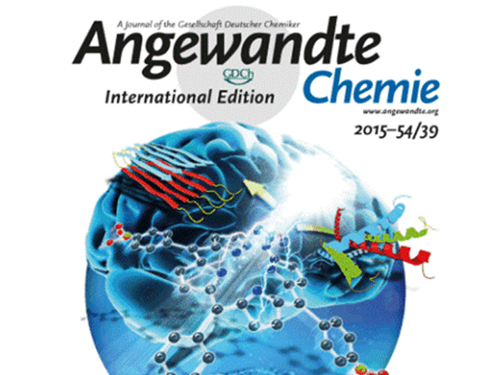 Using Light to Treat Alzheimer's Disease
Medical application of photoactive chemicals offers a promising therapeutic strategy for neurodegenerative diseases.
A research team jointly led by Professor Chan Beum Park of the Materials Science and Engineering Department at KAIST and Dr. Kwon Yu from the Bionano Center at the Korea Research Institute of Bioscience and Biotechnology (KRIBB) conducted research to suppress an abnormal assembly of beta-amyloids, a protein commonly found in the brain, by using photo-excited porphyrins.
Beta-amyloid plaques are known to cause Alzheimer's disease. This research finding suggests new ways to treat neurodegenerative illnesses including Alzheimer's disease. It was published online as the lead article in the September 21th issue of Angewandte Chemie. The title of the article is “Photo-excited Porphyrins as a Strong Suppressor of ß-Amyloid Aggregation and Synaptic Toxicity.”
Light-induced treatments using organic photosensitizers have advantages to managing the treatment in time and area. In the case of cancer treatments, doctors use photodynamic therapies where a patient is injected with an organic photosensitizer, and a light is shed on the patient’s lesion. However, such therapies had never been employed to treat neurodegenerative diseases.
Alzheimer's starts when a protein called beta-amyloid is created and deposited in a patient’s brain. The abnormally folded protein created this way harms the brain cells by inducing the degradation of brain functions, for example, dementia. If beta-amyloid creation can be suppressed at an early stage, the formation of amyloid deposits will stop. This could prevent Alzheimer’s disease or halt its progress.
The research team effectively prevented the buildup of beta-amyloids by using blue LED lights and a porphyrin inducer, which is a biocompatible organic compound. By absorbing light energy, a photosensitizer such as porphyrin reaches the excitation state. Active oxygen is created as the porphyrin returns to its ground state. The active oxygen oxidizes a beta-amyloid monomer, and by combining with it, disturbs its assembly.
The technique was tested on drosophilae or fruit flies, which were produced to model Alzheimer on invertebrates. The research showed that symptoms of Alzheimer's disease in the fruit flies such as damage on synapse and muscle, neuronal apoptosis, degradation in motility, and decreased longevity were alleviated. Treatments with light provide additional benefits: less medication is needed than other drug treatments, and there are fewer side effects. When developed, photodynamic therapy will be used widely for this reason.
Professor Park said, “This work has significance as it was the first case to use light and photosensitizers to stop deposits of beta-amyloids. We plan to carry the research further by testing compatibility with other organic and inorganic photosensitizers and by changing the subject of photodynamic therapy to vertebrate such as mice.”
Picture 1 – Deposits of Beta-Amyloid in Fruit Flies Stopped by Using Porphyrin and Blue LED Lights
Picture 2 – The Research Finding Published as the Lead Article in Angewandte Chemie (September 2015)
2015.11.11 View 11463
Using Light to Treat Alzheimer's Disease
Medical application of photoactive chemicals offers a promising therapeutic strategy for neurodegenerative diseases.
A research team jointly led by Professor Chan Beum Park of the Materials Science and Engineering Department at KAIST and Dr. Kwon Yu from the Bionano Center at the Korea Research Institute of Bioscience and Biotechnology (KRIBB) conducted research to suppress an abnormal assembly of beta-amyloids, a protein commonly found in the brain, by using photo-excited porphyrins.
Beta-amyloid plaques are known to cause Alzheimer's disease. This research finding suggests new ways to treat neurodegenerative illnesses including Alzheimer's disease. It was published online as the lead article in the September 21th issue of Angewandte Chemie. The title of the article is “Photo-excited Porphyrins as a Strong Suppressor of ß-Amyloid Aggregation and Synaptic Toxicity.”
Light-induced treatments using organic photosensitizers have advantages to managing the treatment in time and area. In the case of cancer treatments, doctors use photodynamic therapies where a patient is injected with an organic photosensitizer, and a light is shed on the patient’s lesion. However, such therapies had never been employed to treat neurodegenerative diseases.
Alzheimer's starts when a protein called beta-amyloid is created and deposited in a patient’s brain. The abnormally folded protein created this way harms the brain cells by inducing the degradation of brain functions, for example, dementia. If beta-amyloid creation can be suppressed at an early stage, the formation of amyloid deposits will stop. This could prevent Alzheimer’s disease or halt its progress.
The research team effectively prevented the buildup of beta-amyloids by using blue LED lights and a porphyrin inducer, which is a biocompatible organic compound. By absorbing light energy, a photosensitizer such as porphyrin reaches the excitation state. Active oxygen is created as the porphyrin returns to its ground state. The active oxygen oxidizes a beta-amyloid monomer, and by combining with it, disturbs its assembly.
The technique was tested on drosophilae or fruit flies, which were produced to model Alzheimer on invertebrates. The research showed that symptoms of Alzheimer's disease in the fruit flies such as damage on synapse and muscle, neuronal apoptosis, degradation in motility, and decreased longevity were alleviated. Treatments with light provide additional benefits: less medication is needed than other drug treatments, and there are fewer side effects. When developed, photodynamic therapy will be used widely for this reason.
Professor Park said, “This work has significance as it was the first case to use light and photosensitizers to stop deposits of beta-amyloids. We plan to carry the research further by testing compatibility with other organic and inorganic photosensitizers and by changing the subject of photodynamic therapy to vertebrate such as mice.”
Picture 1 – Deposits of Beta-Amyloid in Fruit Flies Stopped by Using Porphyrin and Blue LED Lights
Picture 2 – The Research Finding Published as the Lead Article in Angewandte Chemie (September 2015)
2015.11.11 View 11463 -
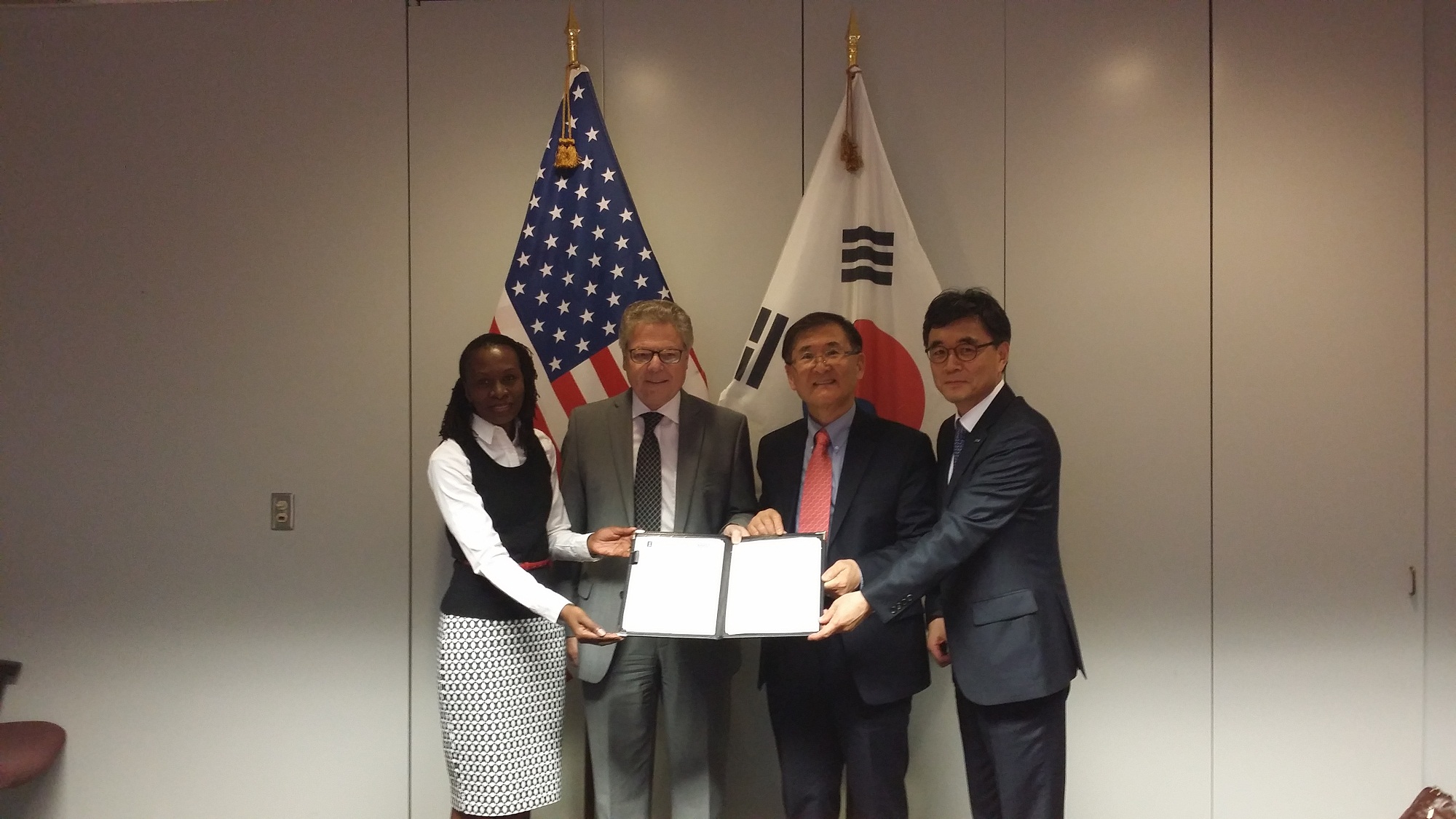 KAIST and University of Illinois at Urbana-Champaign Sign a MOU
KAIST and the University of Illinois at Urbana-Champaign (UIUC) signed a memorandum of understanding on collaboration of research and education on November 5, 2015, at the UIUC campus.
The agreement was made at the request of UIUC, under which the two institutions will exchange students and faculty and implement joint research projects.
President Steve Kang of KAIST said, “With this partnership, KAIST and the University of Illinois at Urbana-Champaign will move forward to advance the fields of medical engineering, life sciences, electrical engineering, and computer science.”
In the picture below, President Steve Kang (second from the right) and Associate Vice President of International Office, Sung-Hyon Myaeng (far right), hold the MOU with UIUC representatives.
2015.11.05 View 5470
KAIST and University of Illinois at Urbana-Champaign Sign a MOU
KAIST and the University of Illinois at Urbana-Champaign (UIUC) signed a memorandum of understanding on collaboration of research and education on November 5, 2015, at the UIUC campus.
The agreement was made at the request of UIUC, under which the two institutions will exchange students and faculty and implement joint research projects.
President Steve Kang of KAIST said, “With this partnership, KAIST and the University of Illinois at Urbana-Champaign will move forward to advance the fields of medical engineering, life sciences, electrical engineering, and computer science.”
In the picture below, President Steve Kang (second from the right) and Associate Vice President of International Office, Sung-Hyon Myaeng (far right), hold the MOU with UIUC representatives.
2015.11.05 View 5470 -
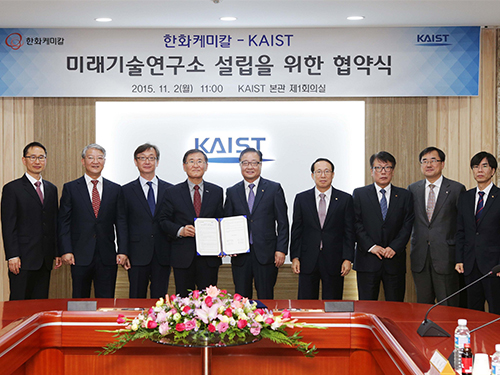 KAIST and Hanwha Chemical Agree on Research Collaboration
KAIST signed a memorandum of understanding (MOU) with Hanwha Chemical Co., Ltd., a Korean chemical and auto manufacturer, on November 2, 2015 to establish a research center on campus.
The research center, which will be named “KAIST-Hanwha Chemical Future Technology Research Center,” will implement joint research projects for five years beginning from 2016 to develop innovative, green technologies that will help the Korean chemical industry boost its global competitiveness and to nurture top researchers and engineers in chemical engineering.
The research center will lead the development of next-generation petrochemical materials and manufacturing technology and the establishment of pure high-refining processes which are more energy-efficient and environmentally friendly. KAIST and Hanwha will strive to secure new technologies that have the greatest commercialization potential in the global market. They will also establish a scholarship fund for 15 KAIST doctoral students in the Department of Chemical and Biomolecular Engineering.
Many professors from the Chemical and Biomolecular Engineering Department including Distinguished Professor Sang Yup Lee, who was listed in the Top 20 Translational Researchers of 2014 by Nature Biotechnology this year, and Professor Hyunjoo Lee who received the Woman Scholar award at the 2015 World Chemistry Conference, will work at the research center.
Professor Lee, the head of the research center, said, “Collaborating with Hanwha will give us a strong basis for our efforts to carry out original research and train the best researchers in the field.”
Chang-Bum Kim, the Chief Executive Officer (CEO) of Hanwha Chemical, said,
“We hope our collaborations with KAIST will go beyond the typical industry and university cooperation. The two organizations will indeed jointly operate the research center, and this will become a new model for industry and university cooperation. We expect that the research center will play a crucial role in the development of new products and technologies to grow the Korean chemical industry.”
In the photo, President Steve Kang of KAIST (fourth from left) and CEO Chang-Bum Kim of Hanwha Chemical (fifth from left) hold the MOU together.
2015.11.01 View 11755
KAIST and Hanwha Chemical Agree on Research Collaboration
KAIST signed a memorandum of understanding (MOU) with Hanwha Chemical Co., Ltd., a Korean chemical and auto manufacturer, on November 2, 2015 to establish a research center on campus.
The research center, which will be named “KAIST-Hanwha Chemical Future Technology Research Center,” will implement joint research projects for five years beginning from 2016 to develop innovative, green technologies that will help the Korean chemical industry boost its global competitiveness and to nurture top researchers and engineers in chemical engineering.
The research center will lead the development of next-generation petrochemical materials and manufacturing technology and the establishment of pure high-refining processes which are more energy-efficient and environmentally friendly. KAIST and Hanwha will strive to secure new technologies that have the greatest commercialization potential in the global market. They will also establish a scholarship fund for 15 KAIST doctoral students in the Department of Chemical and Biomolecular Engineering.
Many professors from the Chemical and Biomolecular Engineering Department including Distinguished Professor Sang Yup Lee, who was listed in the Top 20 Translational Researchers of 2014 by Nature Biotechnology this year, and Professor Hyunjoo Lee who received the Woman Scholar award at the 2015 World Chemistry Conference, will work at the research center.
Professor Lee, the head of the research center, said, “Collaborating with Hanwha will give us a strong basis for our efforts to carry out original research and train the best researchers in the field.”
Chang-Bum Kim, the Chief Executive Officer (CEO) of Hanwha Chemical, said,
“We hope our collaborations with KAIST will go beyond the typical industry and university cooperation. The two organizations will indeed jointly operate the research center, and this will become a new model for industry and university cooperation. We expect that the research center will play a crucial role in the development of new products and technologies to grow the Korean chemical industry.”
In the photo, President Steve Kang of KAIST (fourth from left) and CEO Chang-Bum Kim of Hanwha Chemical (fifth from left) hold the MOU together.
2015.11.01 View 11755 -
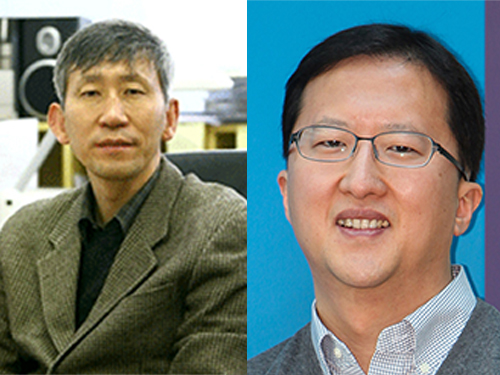 Professors Sukbok Chang and Jang-Wook Choi Receive the 2015 Knowledge Award from the Korean Government
The Ministry of Science, ICT and Future Planning (MISP) of the Republic of Korea announced the 2015 Knowledge Awards on October 20, 2015. Two KAIST professors received the award.
Established in 2009, the awards are presented to Korean scientists whose publications have contributed to the international science community. Specifically, the MISP used the two biggest science databases, Science Citation Index Expanded (SCIE) and Scopus, to identify ten highly cited papers ranked in the top 1% by total citations in the past ten years.
Professor Sukbok Chang of Chemistry (left in the picture below) is a global authority in the field of catalytic hydrocarbon functionalization. His paper entitled “Palladium-catalyzed C-H Functionalization of Pyridine N-Oxides: Highly Selective Alkenylation and Direct Arylation with Unactivated Arenes,” which was published in the Journal of the American Chemical Society in 2008, was once selected by Thomson Reuters as one of the “Most Influential Research Papers of the Month.” In 2011, the American Chemical Society included his paper in the list of the top 20 research papers that were most frequently cited in the last three years.
Professor Jang-Wook Choi of the Graduate School of EEWS (Energy, Environment, Water, and Sustainability) has been known for his leading research in rechargeable battery, supercapacitor, and materials chemistry. In particular, his work on secondary fuel cells attracted significant attention from academia and industry in Korea. Professor Choi developed a super-thin flexible lithium-ion battery this year, thinner than a credit card, which lasts longer than the existing batteries and with greater performance. He also developed new electrode materials for next-generation sodium-ion and magnesium secondary fuel cells.
Professor Sukbok Chang (left) and Professor Jang-Wook Choi (right)
2015.10.23 View 12211
Professors Sukbok Chang and Jang-Wook Choi Receive the 2015 Knowledge Award from the Korean Government
The Ministry of Science, ICT and Future Planning (MISP) of the Republic of Korea announced the 2015 Knowledge Awards on October 20, 2015. Two KAIST professors received the award.
Established in 2009, the awards are presented to Korean scientists whose publications have contributed to the international science community. Specifically, the MISP used the two biggest science databases, Science Citation Index Expanded (SCIE) and Scopus, to identify ten highly cited papers ranked in the top 1% by total citations in the past ten years.
Professor Sukbok Chang of Chemistry (left in the picture below) is a global authority in the field of catalytic hydrocarbon functionalization. His paper entitled “Palladium-catalyzed C-H Functionalization of Pyridine N-Oxides: Highly Selective Alkenylation and Direct Arylation with Unactivated Arenes,” which was published in the Journal of the American Chemical Society in 2008, was once selected by Thomson Reuters as one of the “Most Influential Research Papers of the Month.” In 2011, the American Chemical Society included his paper in the list of the top 20 research papers that were most frequently cited in the last three years.
Professor Jang-Wook Choi of the Graduate School of EEWS (Energy, Environment, Water, and Sustainability) has been known for his leading research in rechargeable battery, supercapacitor, and materials chemistry. In particular, his work on secondary fuel cells attracted significant attention from academia and industry in Korea. Professor Choi developed a super-thin flexible lithium-ion battery this year, thinner than a credit card, which lasts longer than the existing batteries and with greater performance. He also developed new electrode materials for next-generation sodium-ion and magnesium secondary fuel cells.
Professor Sukbok Chang (left) and Professor Jang-Wook Choi (right)
2015.10.23 View 12211 -
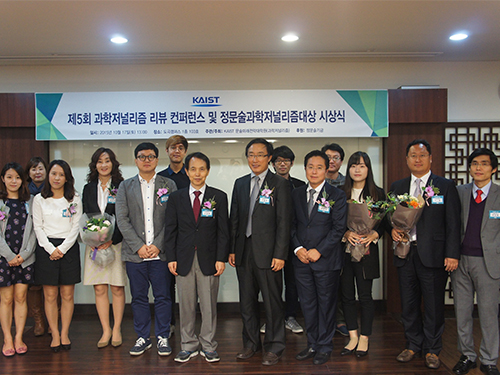 KAIST's Moon Soul Graduate School of Future Strategy Names Recipients of Science Journalism Awards
The Science Journalism Masters Program of the Moon Soul Graduate School of Future Strategy at KAIST named the winners of the 2015 Science Journalism Awards on October 17, 2015. The award ceremony took place at KAIST’s Seoul campus.
The awards were created in 2011 to recognize exemplary journalism that has contributed to the advancement of science and technology in Korea.
This year, the Korean Broadcasting System’s science show called the “Jang Yeong-Sil Show” received the Grand Prize. Yeong-Sil Jang was a Korean scientist and astronomer during the Joseon Dynasty in the 14th century.
A television documentary on challenges facing farm-raised chickens, which was produced by the Munhwa Broadcasting Corporation in Jeonju City, won the TV Award, while news coverage by Dong-A Daily on the outbreak of the Middle East respiratory Syndrome (MERS) in Korea received the Print Award.
After the award ceremony, students and professors of the Science Journalism Program hosted a conference to review and discuss major issues covered by the news media in the past year.
2015.10.15 View 7124
KAIST's Moon Soul Graduate School of Future Strategy Names Recipients of Science Journalism Awards
The Science Journalism Masters Program of the Moon Soul Graduate School of Future Strategy at KAIST named the winners of the 2015 Science Journalism Awards on October 17, 2015. The award ceremony took place at KAIST’s Seoul campus.
The awards were created in 2011 to recognize exemplary journalism that has contributed to the advancement of science and technology in Korea.
This year, the Korean Broadcasting System’s science show called the “Jang Yeong-Sil Show” received the Grand Prize. Yeong-Sil Jang was a Korean scientist and astronomer during the Joseon Dynasty in the 14th century.
A television documentary on challenges facing farm-raised chickens, which was produced by the Munhwa Broadcasting Corporation in Jeonju City, won the TV Award, while news coverage by Dong-A Daily on the outbreak of the Middle East respiratory Syndrome (MERS) in Korea received the Print Award.
After the award ceremony, students and professors of the Science Journalism Program hosted a conference to review and discuss major issues covered by the news media in the past year.
2015.10.15 View 7124 -
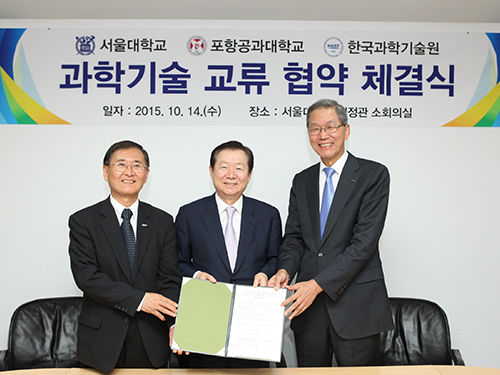 KAIST Teams Up with Korean Universities for MOOCs
KAIST, Seoul National University (SNU), and the Pohang University of Science and Technology (POSTECH) agreed to cooperate in the development of Massive Open Online Courses (MOOCs) for Korean viewers. The agreement ceremony took place at the SNU campus on October 14, 2015.
Under the agreement, professors from all three universities will jointly create and implement online courses on science and engineering by the summer of 2016. The MOOCs will largely consist of basic courses on physics, chemistry, life science, mechanical engineering, and material science. Anyone from a high school student to an adult who is interested in science can take these online courses.
Some of the participating professors will be President Doh-Yeon Kim of POSTECH, Dean Seong-Keun Kim of Natural Sciences College at SNU, Dean Kun-Woo Lee of Engineering College at SNU, Dean Jung-Hoe Kim of Life Science and Bioengineering College at KAIST, Dean Do-Kyung Kim of Academic Affairs at KAIST, Dean Kun-Hong Lee of Engineering College at POSTECH, and Dean Joon-Won Park of Science College at POSTECH.
President Steve Kang of KAIST said,
“Many of Korea’s most distinguished professors in science and engineering will participate in the MOOCs. People, particularly young students aspiring to study science and technology at universities, should definitely take advantage of this opportunity.”
In the picture from left to right is President Steve Kang of KAIST, President Nak-In Sung of Seoul National University, and President Doh-Yeon Kim of Pohang University of Science and Technology.
2015.10.14 View 7910
KAIST Teams Up with Korean Universities for MOOCs
KAIST, Seoul National University (SNU), and the Pohang University of Science and Technology (POSTECH) agreed to cooperate in the development of Massive Open Online Courses (MOOCs) for Korean viewers. The agreement ceremony took place at the SNU campus on October 14, 2015.
Under the agreement, professors from all three universities will jointly create and implement online courses on science and engineering by the summer of 2016. The MOOCs will largely consist of basic courses on physics, chemistry, life science, mechanical engineering, and material science. Anyone from a high school student to an adult who is interested in science can take these online courses.
Some of the participating professors will be President Doh-Yeon Kim of POSTECH, Dean Seong-Keun Kim of Natural Sciences College at SNU, Dean Kun-Woo Lee of Engineering College at SNU, Dean Jung-Hoe Kim of Life Science and Bioengineering College at KAIST, Dean Do-Kyung Kim of Academic Affairs at KAIST, Dean Kun-Hong Lee of Engineering College at POSTECH, and Dean Joon-Won Park of Science College at POSTECH.
President Steve Kang of KAIST said,
“Many of Korea’s most distinguished professors in science and engineering will participate in the MOOCs. People, particularly young students aspiring to study science and technology at universities, should definitely take advantage of this opportunity.”
In the picture from left to right is President Steve Kang of KAIST, President Nak-In Sung of Seoul National University, and President Doh-Yeon Kim of Pohang University of Science and Technology.
2015.10.14 View 7910 -
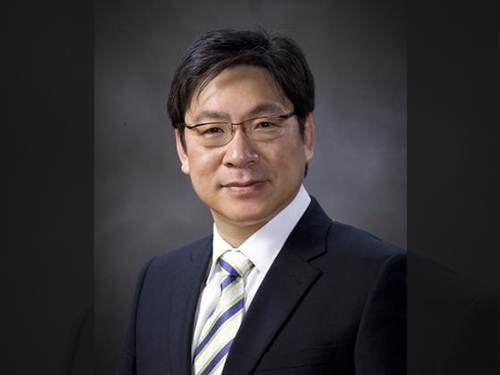 Professor Key-Sun Choi Receives the Order of Service Merit Green Stripes from the Korean Government
The award recognizes Professor Choi’s life-long research effort to make Korean language digitally available, both nationally and internationally.
Professor Key-Sun Choi of the School of Computing at KAIST received the Order of Service Merit Green Stripes from the Korean government at the 569th Korean Language Day, held annually to commemorate the invention of the Korean language, Hangeul. The ceremony took place on October 9, 2015, at the Sejong Center in Seoul.
Professor Choi has distinguished himself in the field of natural language processing (NLP), including Korean language. He developed a Korean NLP parser that enabled information processing and data analysis of Korean language, as well as a digital Korean dictionary, contributing to the advancement of Korean language-based information technology.
Professor Choi also led the way to widespread use of Korean natural language in computing by developing and commercializing open source software to process the Korean language.
He has served leading roles in many of the international academic societies and standardization organizations, among others, as the vice president of Infoterm (the International Information Center for Terminology), president of the Asia Federation of Natural Language Processing, vice chair of ISO/TC 37, a technical committee in the International Organization for Standardization (ISO), and a council member for the International Association of Machine Translation.
2015.10.08 View 9006
Professor Key-Sun Choi Receives the Order of Service Merit Green Stripes from the Korean Government
The award recognizes Professor Choi’s life-long research effort to make Korean language digitally available, both nationally and internationally.
Professor Key-Sun Choi of the School of Computing at KAIST received the Order of Service Merit Green Stripes from the Korean government at the 569th Korean Language Day, held annually to commemorate the invention of the Korean language, Hangeul. The ceremony took place on October 9, 2015, at the Sejong Center in Seoul.
Professor Choi has distinguished himself in the field of natural language processing (NLP), including Korean language. He developed a Korean NLP parser that enabled information processing and data analysis of Korean language, as well as a digital Korean dictionary, contributing to the advancement of Korean language-based information technology.
Professor Choi also led the way to widespread use of Korean natural language in computing by developing and commercializing open source software to process the Korean language.
He has served leading roles in many of the international academic societies and standardization organizations, among others, as the vice president of Infoterm (the International Information Center for Terminology), president of the Asia Federation of Natural Language Processing, vice chair of ISO/TC 37, a technical committee in the International Organization for Standardization (ISO), and a council member for the International Association of Machine Translation.
2015.10.08 View 9006 -
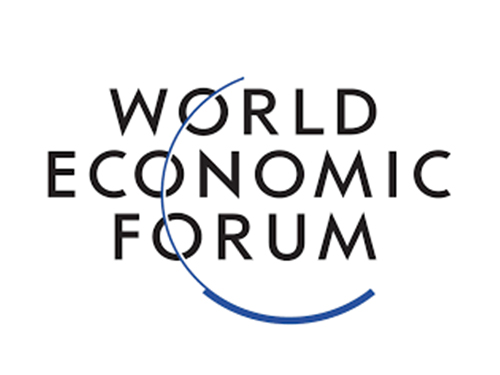 KAIST Participates in the World Economic Forum's Annual Meeting of the New Champions 2015 in China
KAIST’s president and its professors actively engage in discussions of major issues on higher education, technology innovation, and industry-university collaboration with global leaders from across all sectors.
President Steve Kang of KAIST participated in the Annual Meeting of the New Champions 2015 (a.k.a., Summer Davos Forum) hosted by the World Economic Forum (WEF). With the theme of “Charting a New Course for Growth,” the Summer Davos Forum took place on September 9-11, 2015 in, Dalian, China.
Currently, KAIST is a member of the Global University Leaders Forum (GULF) of WEF, a gathering of the presidents of the top 25 universities in the world, including Harvard University, Massachusetts Institute of Technology, University of Tokyo, University of Oxford, Peking University, and National University of Singapore. GULF allows university leaders an opportunity to have high-level dialogues on higher education and research and explore prospects for cooperative ventures.
President Kang led the discussion of the GULF session at the Summer Davos Forum, which was held on September 10, 2015, with 25 university leaders as well as two business leaders from Chinese companies: Huawei Technologies Co. Ltd., and Sanofi China. The participants shared candid perspectives on industry-university collaboration, particularly the need for such partnerships in Asia.
In addition, KAIST hosted the fourth IdeasLab session, entitled “Bio versus Nano Materials, on September 9, 2015. At the session, four KAIST professors held an in-depth debate and discussion with the audience on whether the next industrial revolution would be driven by advances in biomaterials or nanomaterials.
The topics under discussion were:
- New materials that mimic biology by Professor Hea Shin Lee
- Bio-based materials that replace petroleum-based materials by Professor Sang Yup Lee
- New materials designed at sub-nano scale by Professor Hee Tae Jung
- A hydrogen economy with nanomaterials by Professor Eun Ae Cho
Since its establishment in 2007, the Summer Davos Forum has become the biggest business and political gathering in Asia, held annually either in Dalian or Tianjin, China. The Forum has attracted more than 1,500 participants primarily from emerging nations such as China, India, Russia, Mexico, and Brazil, and has offered an open platform to address issues important to the region and the global community.
2015.09.14 View 8755
KAIST Participates in the World Economic Forum's Annual Meeting of the New Champions 2015 in China
KAIST’s president and its professors actively engage in discussions of major issues on higher education, technology innovation, and industry-university collaboration with global leaders from across all sectors.
President Steve Kang of KAIST participated in the Annual Meeting of the New Champions 2015 (a.k.a., Summer Davos Forum) hosted by the World Economic Forum (WEF). With the theme of “Charting a New Course for Growth,” the Summer Davos Forum took place on September 9-11, 2015 in, Dalian, China.
Currently, KAIST is a member of the Global University Leaders Forum (GULF) of WEF, a gathering of the presidents of the top 25 universities in the world, including Harvard University, Massachusetts Institute of Technology, University of Tokyo, University of Oxford, Peking University, and National University of Singapore. GULF allows university leaders an opportunity to have high-level dialogues on higher education and research and explore prospects for cooperative ventures.
President Kang led the discussion of the GULF session at the Summer Davos Forum, which was held on September 10, 2015, with 25 university leaders as well as two business leaders from Chinese companies: Huawei Technologies Co. Ltd., and Sanofi China. The participants shared candid perspectives on industry-university collaboration, particularly the need for such partnerships in Asia.
In addition, KAIST hosted the fourth IdeasLab session, entitled “Bio versus Nano Materials, on September 9, 2015. At the session, four KAIST professors held an in-depth debate and discussion with the audience on whether the next industrial revolution would be driven by advances in biomaterials or nanomaterials.
The topics under discussion were:
- New materials that mimic biology by Professor Hea Shin Lee
- Bio-based materials that replace petroleum-based materials by Professor Sang Yup Lee
- New materials designed at sub-nano scale by Professor Hee Tae Jung
- A hydrogen economy with nanomaterials by Professor Eun Ae Cho
Since its establishment in 2007, the Summer Davos Forum has become the biggest business and political gathering in Asia, held annually either in Dalian or Tianjin, China. The Forum has attracted more than 1,500 participants primarily from emerging nations such as China, India, Russia, Mexico, and Brazil, and has offered an open platform to address issues important to the region and the global community.
2015.09.14 View 8755 -
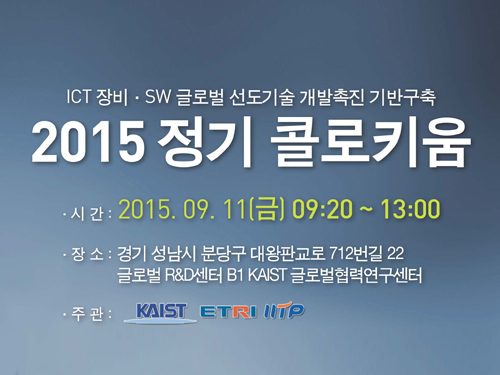 KAIST to Hold a Colloquium on the Internet of Things and Open Stack
With the support of the Ministry of Science, ICT, and Future Planning of Korea, KAIST hosted a colloquium on the Internet of Things (IoT) and Open Stack at the KAIST Research Center for Global Cooperation located in Pangyo. The upcoming event was organized to provide an overview of the technological trends to IT companies and foster their success in the global market.
The colloquium invited numerous field-experts as speakers and discussed the influence of IoT and OpenStack on the small- and medium-sized companies in Korea.
Professor Gwan-Hoo Lee from the American University joined as a speaker and shared his insights of how IoT would change the global business environment. He introduced various business models developed by Microsoft, Intel, Apple, Google, and Cisco and discussed how Korean companies could utilize the existing tools and strategy to succeed in the global market. His talk focused specifically on the importance of overseas partnerships and technology stack analysis.
President Hyun-Jung Jang from the Korean OpenStack Community also gave a speech on global partnership through OpenStack. He discussed the future trends of OpenStack and why companies should invest in the field.
KAIST used the event as an opportunity to provide information to domestic companies that are interested in building partnerships with overseas companies and in developing new IoT and OpenStack technology.
More information about the event can be provided online at www.ictc.or.kr.
2015.09.11 View 5479
KAIST to Hold a Colloquium on the Internet of Things and Open Stack
With the support of the Ministry of Science, ICT, and Future Planning of Korea, KAIST hosted a colloquium on the Internet of Things (IoT) and Open Stack at the KAIST Research Center for Global Cooperation located in Pangyo. The upcoming event was organized to provide an overview of the technological trends to IT companies and foster their success in the global market.
The colloquium invited numerous field-experts as speakers and discussed the influence of IoT and OpenStack on the small- and medium-sized companies in Korea.
Professor Gwan-Hoo Lee from the American University joined as a speaker and shared his insights of how IoT would change the global business environment. He introduced various business models developed by Microsoft, Intel, Apple, Google, and Cisco and discussed how Korean companies could utilize the existing tools and strategy to succeed in the global market. His talk focused specifically on the importance of overseas partnerships and technology stack analysis.
President Hyun-Jung Jang from the Korean OpenStack Community also gave a speech on global partnership through OpenStack. He discussed the future trends of OpenStack and why companies should invest in the field.
KAIST used the event as an opportunity to provide information to domestic companies that are interested in building partnerships with overseas companies and in developing new IoT and OpenStack technology.
More information about the event can be provided online at www.ictc.or.kr.
2015.09.11 View 5479